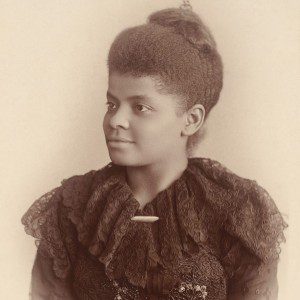Among the fun things for me on Facebook is when Friends point me in directions I was previously unaware of. Today my friend, and not just a Facebook “friend,” but a real life one, Florence Caplow noted that this Ida B. Wells’ birthday.
I followed the link…
Oh, my…
Ida B. Wells was born a slave in Holly Springs, Mississippi, on the 19th of July, 1862. After obtaining his freedom her father was able to further his education and even attend briefly college. He worked as a master carpenter. Ida was sent to Shaw University where her father had been, but was expelled following a confrontation with the college’s president. It appears she was readmitted to continue her studies.
But when her parents died from Yellow Fever she went to work as a school teacher to support her siblings. While working she also continued stuyding, at Fisk and at LeMoyne.
In addition to confronting issues of race, she also stood up to the men running things. The Wikipedia article cites her at twenty-four declaring: “I will not begin at this late day by doing what my soul abhors; sugaring men, weak deceitful creatures, with flattery to retain them as escorts or to gratify a revenge.
Refusing to give up a seat on a train and being dragged off, Wells sued. In 1887 she won, but it was reversed by the Tennessee Supreme Court. It would be nearly a hundred years before this issue would be resolved when Rosa Parks did the same on a bus…
In 1892, after three friends were lynched, she began to research the history of lynching in America, which culminated in a pamphlet, “Southern Horrors: Lynch Laws in All Its Phases.” Following a mob destroying her printing press, she left the South. She continued to write.
While working on a protest of how African Americans were treated at the 1893 Columbia Exposition in Chicago, she decided to stay in the city, going to work for the Chicago Conservator, Chicago’s oldest African American paper.
When she married she kept her name. She and her husband Ferdinand Barnett had three children. Except for a period focused on her children Wells was an active speaker and writer, continuing her crusade against lynching, for civil rights and women’s rights for the whole of her life.
She died in Chicago at sixty-eight, in 1931.
Again Wikipedia. It cites Tazewell Thompson who wrote of Wells, that she was
“…A woman born in slavery, she would grow to become one of the great pioneer activists of the Civil Rights movement. A precursor of Rosa Parks, she was a suffragist, newspaper editor and publisher, investigative journalist, co-founder of the NAACP, political candidate, mother, wife, and the single most powerful leader in the anti-lynching campaign in America. A dynamic, controversial, temperamental, uncompromising race woman, she broke bread and crossed swords with some of the movers and shakers of her time: Frederick Douglass, Susan B. Anthony, Marcus Garvey, Booker T. Washington, W. E. B. Du Bois, Frances Willard, and President McKinley. By any fair assessment, she was a seminal figure in Post-Reconstruction America.”













